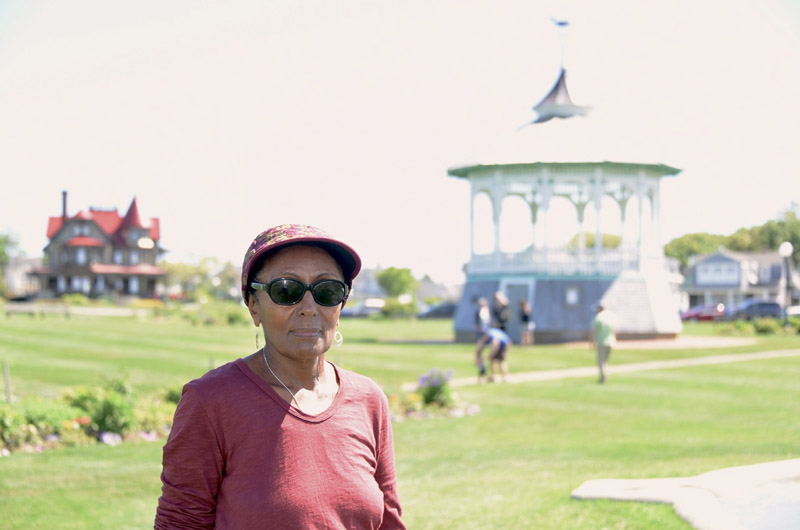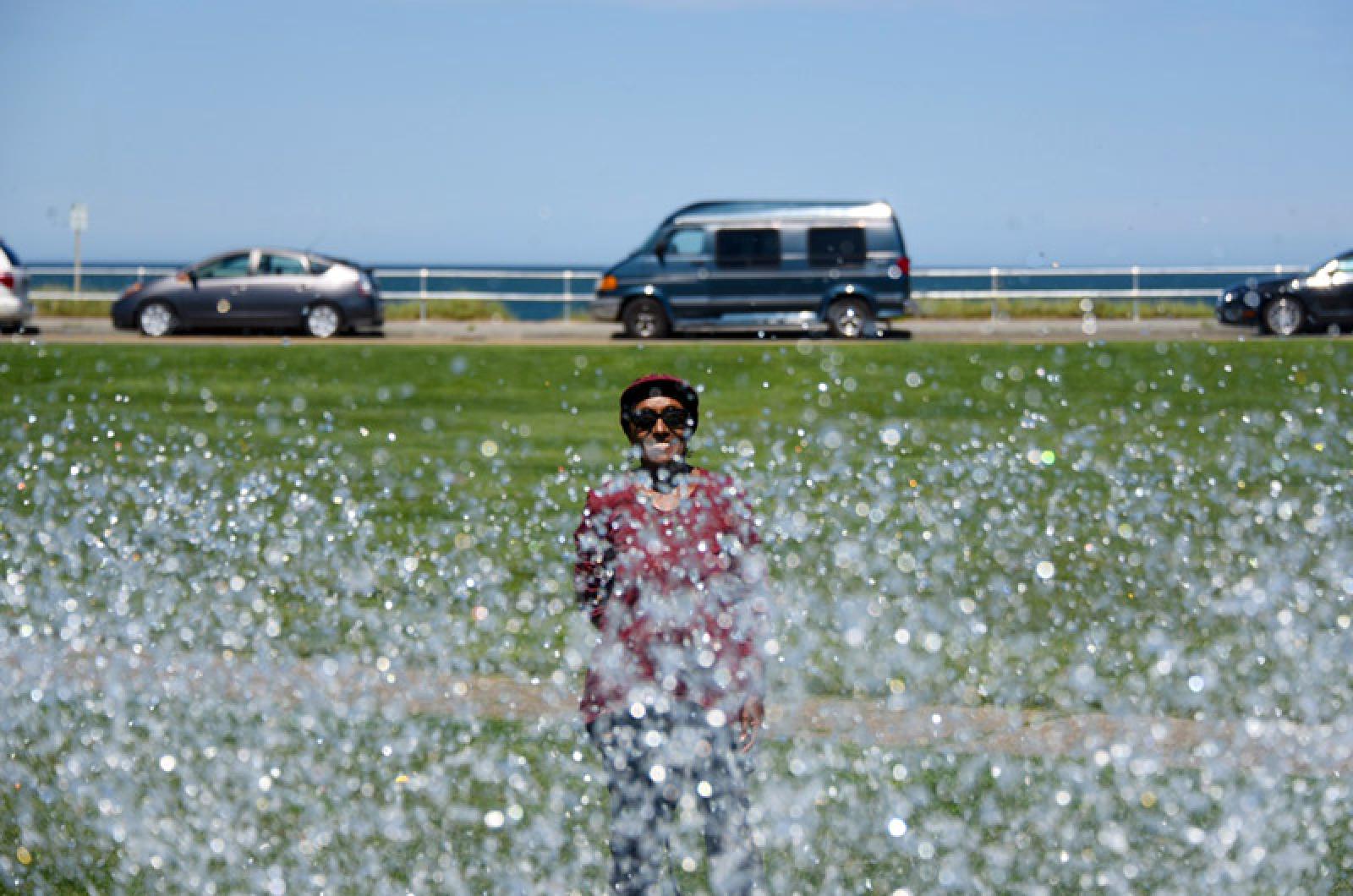Utopia exists here on earth. According to filmmaker Salem Mekuria, it’s a small community in northern Ethiopia called Awra Amba.
The village is the subject of Ms. Mekuria’s documentary film titled Awra Amba’s E(utopia). She will screen some of the footage she’s gathered on Sunday, June 25 at an event hosted at the Hebrew Center as a fundraiser for the community’s effort to purchase a solar-powered water pump.
Ms. Mekuria is a seasonal resident of Oak Bluffs and retired professor from Wellesley College. She lives in Ethiopia’s capital city, Addis Ababa, and five years ago, in her home city, she noticed an exotic hat at a Hilton Hotel. The unusual headgear sparked her curiosity and she remarked about it to her friend, who happened to know its owner.
The hat belonged to a man named Zumra Nuru, the founder of Awra Amba, an egalitarian community located over 600 kilometers north of Addis Ababa with an economy based around sharing. Ms. Mekuria’s friend introduced the two and they arranged a meeting.

“We met and I just fell in love with them,” she said. “The fact that this kind of community existed in Ethiopia, for almost 40 years at the time I met them… and that they were able to survive for this long, and grow into a community of, they started with 19 people, and now they’re over 500.”
Curious to learn more, she went to Awra Amba in person a few days after the meeting. When she got there, it wasn’t exactly Shangri-La.
“Given my expectations of what this community was and what they described, as a utopia, kind of, I was very surprised that it was so poor,” Ms. Mekuria said. “It’s a dusty little village.”
While it doesn’t seem exceptional on the face of it, “Once you start living there, spending time there, talking to the people, seeing what they’re doing, then you see that it is a really special place.”
She immediately began work on a documentary project, exploring the village and recording what she found. Every year since, she has visited the community, working on the film bit by bit.
“I don’t really have a timeline,” she said. “I want to be able to see where it takes me. Right now I’m really recording my curiosity.”
Everyone in the community shares power and the division of labor doesn’t fall along gender lines. “They believe everybody is equal under the sun. It doesn’t matter what race, creed, nationality,” Ms. Mekuria said.
They also place a strong emphasis on education, and elders are respected and cared for. Awra Amba has the only elder home in the country outside of the capital city, which even welcomes elders from communities outside their own. The villagers do without luxury goods and intoxicants, but their basic needs are met.
“Everybody eats three meals a day, everybody gets milk, they work every day, their children go to school, their children are doing really well in school, and they share everything and they have each other and they help each other. To me, that’s really the meaning of utopia.”
But to others their lifestyle and values are controversial, especially to neighboring conservative Muslim and Christian communities. For years they were subjected to homemade bomb attacks, attempts on the life of their founder and even exile, which occurred during Ethiopia’s military dictatorship.
Today, the community is no longer a target. The government has recognized the village as a tourist attraction worth protecting. Surrounding villages have come to see the services Awra Amba provides, such as a mill that is used to grind seeds to produce oil, as indispensable.
Their mill is one example of what Ms. Mekuria describes as the community’s enterprising and innovative spirit. Another venture is weaving, which they took up after losing much of their farmland.
Now the villagers hope to farm what land they do have once again. Awra Amba is situated on land in the longest-inhabited area in Ethiopia, which also happens to be the dry part of the country. Ms. Mekuria describes the land as old and tired. Without irrigation, it is not arable.
The community has two small, relatively shallow boreholes that they dug themselves, but these wells can’t even supply the community with sufficient drinking water in the dry season, which lasts from October to June. Climate change has exacerbated the issue. Whereas before they had two rainy seasons, they now have only one.
A tantalizing option for Awra Amba lies in a 126-meter-deep well that the regional government dug 12 years ago. Toward the end of the project, the government ran out of money to equip the well with a pump. So they capped it and left the hole there, full of water just barely out of reach.
Two and a half years ago, Ms. Mekuria decided to raise money for the village to purchase an electric pump for this well. Attendant challenges followed. It also required a meter and a transformer, and even after securing these items, the village ran into more problems. Power in Ethiopia is hydroelectric, and so in the dry season it is scarce. It’s also unreliable, expensive, and typically diverted to urban areas over rural villages.
The electric pump is a stopgap for now. The community ultimately hopes to secure a solar powered system, which they see as a sustainable option that will allow them greater self-sufficiency.
The fundraiser at the Hebrew Center includes an Ethiopian dinner, a preview of Ms. Mekuria’s film and a performance from Ethiopian jazz singer Munit Mesfin accompanied by Jeremy Berlin.
Ms. Mekuria acknowledged that talk of utopia, especially now, can seem out of touch if not downright naïve. “When I talk about it I sometimes feel so Pollyannaish,” she said. But she has observed it firsthand.
“I think they’re an incredible example of how you can live with so little, and still have a happy life.” Ms. Mekuria said. “I would say utopia should not necessarily be based on material achievement. It’s really how you live with people, how you think of yourself.”
The event begins at 5:30 p.m. on June 25 at the Martha’s Vineyard Hebrew Center. Tickets are $100 per person. For more information, visit salemmekuria.com .




Comments (1)
Comments
Comment policy »